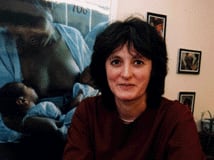“Like the WHO Nestle believes that breastmilk is the best nutrition for infants,” a spokesperson for the Swiss food giant told us.
“We support their recommendation of six months exclusive breastfeeding, followed by the introduction of adequate nutritious complementary foods along with sustained breastfeeding until up to two years of age and beyond. We have a global commitment to market our breastmilk substitutes responsibly and comply with the WHO Code as implemented by national governments everywhere in the world, as a minimum.”
But a report produced by the WHO as part of World Breastfeeding Week last week found Europe had the world’s lowest breastfeeding rates, citing multiple factors including obese mothers, socio-economic conditions and promotion of infant formulas and foodstuffs.
WHO figures from 21 European countries show only 13% of mothers exclusively feed their babies until six months. In south east Asia the rate is 43%.
Patti Rundall OBE, group policy director at UK-based breastfeeding advocacy group Baby Milk Action (BMA), welcomed the WHO reiteration of exclusive 0-6 month breastfeeding.
“The WHO statement sends the right signals and can help the cause of breastfeeding,” Rundall said. “But despite the existence of some very limited restrictions on the marketing of infant formulas, there are virtually no restrictions on products that target infants and young children over the age of six months such as follow-on formulas and children’s milks, and manufacturers exploit these weak laws to the full with T adverts and idealising and misleading claims."
She said application of EU rules that prevents marketing of infant formulas varied wildly and enforcement was often lax.
More pressure could be exerted on European and other nations to abide by the International Code of Marketing of Breast-milk Substitutes and all the subsequent relevant World Health Assembly Resolutions.
BMA wants the European Commission to restrict marketing of follow-on formulas, 'children’s nutrient milks’ and all foods targeting 1-3 year olds, following on from the opinion of the European Food Safety Authority (EFSA) and other bodies that they offered nothing unique to an infant’s diet.
"These products, often high in sugar, share branding with infant formulas, undermine breastfeeding both before and after six months and increase the risk of childhood obesity."
Actions

Rundall will attend a WHO meeting in Geneva next week where regulations around formula marketing are on the table for discussion. More pressure could be exerted on European and other nations to abide by the International Code of Marketing of Breast-milk Substitutes and other World Health Assembly Resolutions.
This week Mexico prohibited the giving away of free infant formula samples in hospitals and clinics as breastfeeding rates drop to the lowest in latin America (one in seven).
While prohibiting giveaways, formula will be available to buy in such places and can be prescribed by a medical professional if there is a feeding issue.
Of plunging rates in Europe, the WHO said: “Even though the rate of early initiation of breastfeeding is very high in some countries, exclusive breastfeeding rates drop rapidly between 4 and 6 months of age and are very low at 6 months.”
It added: “Poverty, difficulty in accessing health services, social marginalisation, obesity (many pregnant women are now overweight or obese), policies in the workplace and the employment market, marketing of breast-milk substitutes, commercial ‘follow-on’ and complementary foods are just some of the reasons for low breastfeeding rates and inequality in the WHO European Region.”
Its recommendations included:
- enacting legislation to restrict the marketing and promotion of infant formulas and other products used as breast-milk substitutes;
- monitoring and enforcing effective sanctions in case of violations;
- engaging in partnerships with civil society organisations to help governments advocate for enactment, implementation, enforcement and monitoring of the Code.
Most of the major formula firms like Nestlé and Danone-Nutricia have come under fire for illegally promoting the use of formula in various countries in recent years.
WHO recommends that breastfeeding commences “within the first hour of birth and be exclusive for 6 months, with the introduction of complementary food after 6 months and continued breastfeeding up until 2 years or beyond.”
Euromonitor International put the global infant formula market at €40bn in 2014, up from about €22.5bn in 2009. Nestlé had about 22% of this market, Mead Johnson Nutrition had 13.6%, Danone-Nutricia 11.8%, Abott Laboratories 9.5% and Royal Friesland Campina 3.8%.
